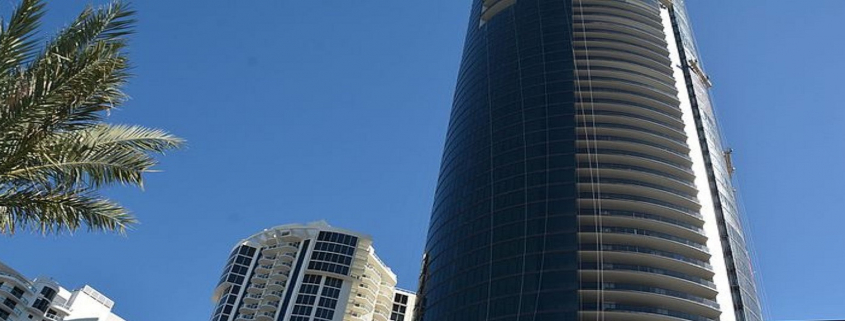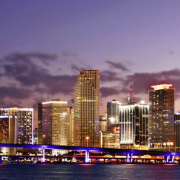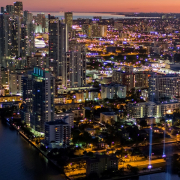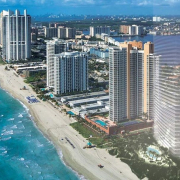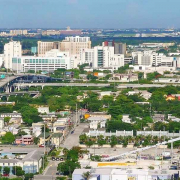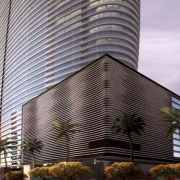Real estate developers, increasingly faced with a bevy of competition, are choosing well-known luxury lifestyle brands to entice buyers with more than just bricks and mortar.
With five luxury brand-affiliated buildings set to open in South Florida by 2021, the sunny region has seemingly become the unofficial home of the branded building, helped in large part by its international buying demographic. The trend is not quite so en vogue in long-established luxury markets. In London and New York City, for example, branding partnerships lean soundly toward hotels as opposed to luxury fashion and automobile brands. But London’s first fashion-brand partnership, a collaboration between Versace Home and the AYKON London One tower in the city’s Nine Elms regeneration zone, is headed to the capital in 2020.
Meanwhile, newer markets like Dubai and Beijing have long been the targets for luxury-branded developments. Dubai’s Armani hotel opened in 2010; last year, Armani’s eco-friendly complex with Smart Hero Group in Beijing was completed. The fashion house is also working on the interiors at Century Spire in Manila, Philippines, set to be completed this year. Meanwhile, Fendi partnered with DAMAC Properties for the interiors of Dubai’s DAMAC Residenze, which opened in 2017.
Miami Likes The Flash
The popularity of the branded-building in the Sunshine State though, boils down to one simple thing, according to one developer.
“Miami is more of a flashier type of city, than other areas like New York or Chicago that are a little more conservative,” said Jon Paul Perez, vice president of Related Group, one of the developers behind Residences by Armani/Casa, set to open in the city in 2019.
The Porsche Design Tower may be one of the most well-known projects to emerge onto the Florida market. The building on Sunny Isles Beach, a barrier island north of Miami, is a collaboration between Dezer Development and high-performance German car manufacturer Porsche.
The 60-story building—designed by Sieger Suarez Architects—was completed last year and comes with a high-powered automobile elevator that transports drivers and their cars from street level to parking at their apartments. Only six of the tower’s 132 residences remain unsold, according to Gil Dezer, president of Dezer Development. Sales launched in 2012.
The automobile collaborations don’t end there. In downtown Miami, British luxury vehicle company Aston Martin has partnered with Argentinian developer G&G Business Developments for their own tower. The 66-story building, set for completion in 2021, will be topped with a triplex penthouse and have amenities like a fitness center and spa, a pool deck and a marina.
But it’s the fashion-conscious buyer that’s really being catered to in the sunshine state. Italian fashion house Fendi paired with developers Château Group for the Fendi Château Residences, the inaugural Fendi-branded residential project. The 12-story building in Surfside was completed in 2016 and houses 58 units, including three penthouses with private rooftop sundecks and swimming pools.
Armani is set to hit the South Florida residential scene in summer 2019 with their Residences by Armani/Casa project. Roughly five blocks away from the Porsche Design Tower in Sunny Isles Beach, the 56-story building is over 75% sold. It’s expected to be finished in the summer of 2019 and the tower will have over 35,000-square-feet of amenities, including a wine cellar and cigar room.
Missoni Baia, in Miami’s Edgewater neighborhood, is a partnership between the fashion house known for its colorful style and developer OKO Group. Designed by Hani Rashid of Asymptote Architecture, the 57-story building is slated for completion in the fall of 2020. It will have 229 residences, ranging in size from 776 to 3,788 square feet.
Why South Florida?
A branded building in South Florida “is a sign of distinction,” said Edgardo Defortuna, the president and CEO of Fortune International Group, the exclusive broker of Missoni Baia.
With so many high-end new buildings from which to choose, being able to distinguish a building is important for developers. And in Miami, where many developers don’t even begin construction until they’ve hit 50% in pre-sales to secure funding and guarantee interest, branding becomes even more important, according to Mr. Defortuna.
“In New York City, you build and then you sell. In Miami, we sell before the building becomes a reality,” Mr. Defortuna said. “To be able to ‘sell the dream,’ so to speak, it’s important to have something to point to.”
Those well-known—and well-respected—brands can theoretically get those buildings built more quickly.
Recipe For Success
Partnership conditions vary from deal to deal, but typically the developer will pay the brand a percentage of sales, typically 2% to 5%, which is paid at the closing of each unit in the building, according to Mr. Defortuna.
“For that fee, the developer has the right to use the name—subject to brand standards—and the brand provides either design or management services, according to the agreement worked out between the parties,” Mr. Defortuna said.
“But for a brand to make a successful foray into real estate, it has to be one that people associate with not only luxury but a certain type of lifestyle that people can relate and aspire to,” Mr. Perez said. “At the same time, it has to be a brand the developer can work with. The brand and designer can have amazing ideas but you have to be able to build those and make them a reality.”
Not only does a partnership have to be chosen with care, but the brand must translate clearly and recognizably into the project.
“In the Aston Martin Residences, it’s not as if the place is emblazoned with wings,” said Marek Reichman, Aston Martin’s chief creative officer and the lead designer on the Aston Martin Residences project, referring to the sports car’s logo. “It’s much more subtle than that.”
Signature materials from the brand’s cars are found in the tower’s interiors, common areas and amenity spaces, like the hand-stitched leather door tabs—sourced from a Scottish village—and the carbon fiber lobby furniture.
“Obviously there’s a design aesthetic,” Mr. Reichman said. “The units remain more neutral. If a customer comes along and is buying, they can make a choice to create their own environment or talk to us and we can advise them or create for them. However much of Aston Martin you want, you can have.”
Not only does the aesthetic matter for the brand itself, but it’s crucial to brand loyalists too, who inevitably become an important section of buyers.
“There’s a real sense of connection with the brand and for our traditionalists that’s brilliant,” Mr. Reichman said. “Buyers so far have been a 50/50 split between customers that know the brand and those who have just come to the showroom regardless of the connection. The real estate venture allows Aston Martin to secure “those new and different customers that we haven’t looked to talk to before because they haven’t come from the traditional automotive channels.”
Who’s Buying?
Foreign buyers purchased $7.1 billion of South Florida residential properties last year, up from $6.2 billion a year ago, according to a recent report by the Miami Association of Realtors. In Miami alone, foreign buyers accounted for 35% of closed sales and purchased 15,400 properties last year, a 41.3% surge from the year before (10,900).
Argentinian buyers led the way, accounting for 15% of South Florida foreign purchases, followed by Venezuela (11%), Canada and Colombia (9% each). It’s for this reason that internationally recognized brands are key.
“Your buyers a lot of the time are from out of the country and associate a lot with these brands,” Mr. Perez said. “They know Armani, even from just going to the stores, they can feel how that is going to transition into the building they’re buying in.”
Of the sales to date at Residences by Armani/Casa, Mr. Perez said 80% have been from international buyers. Robert Thorne, CEO and founder of Miami-based The Wellness Habitat Co., is one of the other 20%. He bought a two-bedroom unit on the 25th floor at Residences by Armani/Casa about two years ago for $1.4 million, as soon as sales launched at the building. The apartment will be Mr. Thorne’s Miami base, he told Mansion Global, now that he primarily lives in Mexico City.
“An important factor in his purchase was the developer,” Mr. Thorne said. “But the brand was the main thing. We had seen the Armani building in Dubai and were convinced by the style. I’m not 100% Armani, but I follow the brand, we have stuff at home from Armani, I wear Armani suits. Just knowing that the brand is behind it, it makes sure that everything else is going to be of quality. We knew our investment was going to be secure.”
Source: Mansion Global

